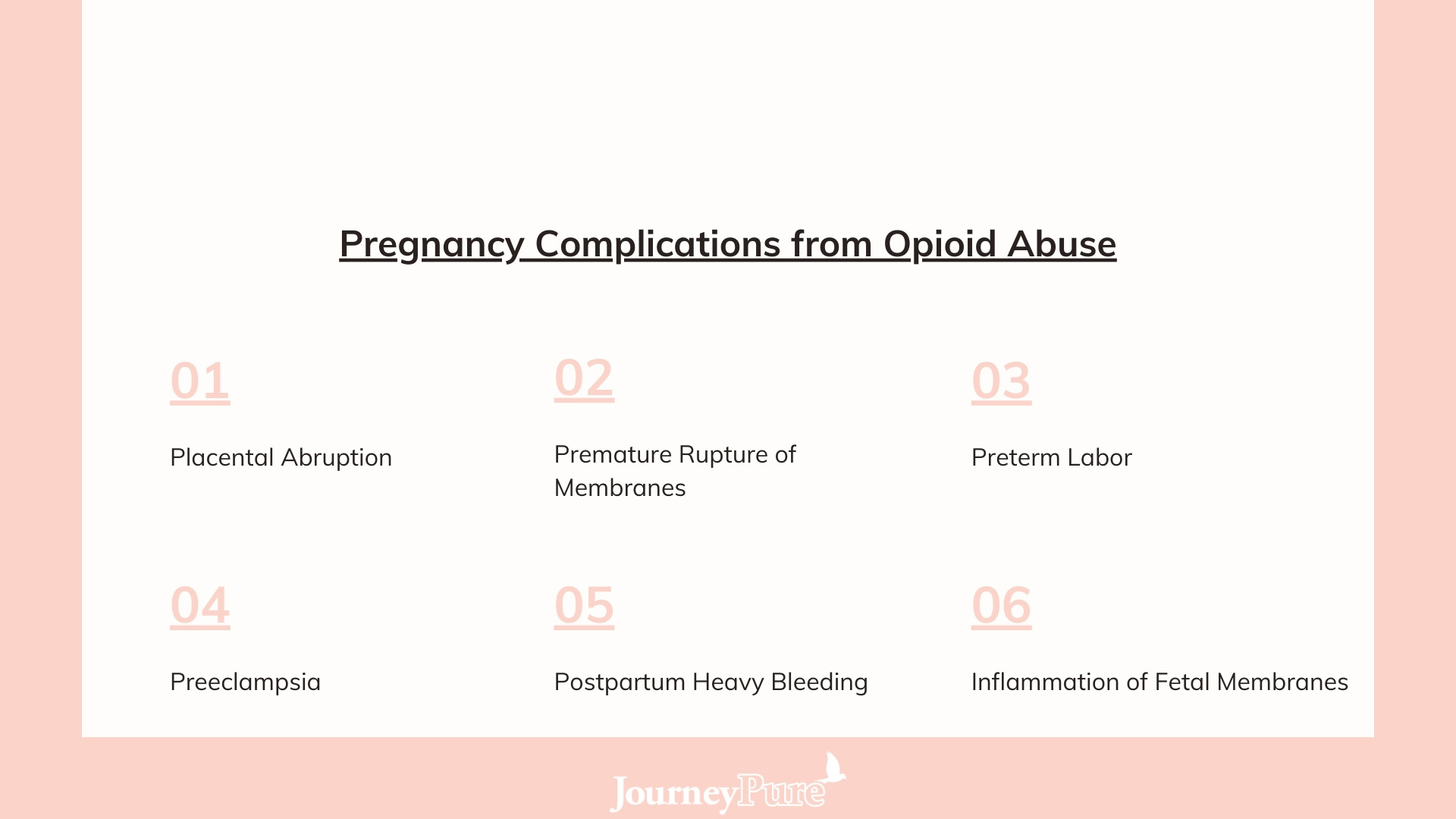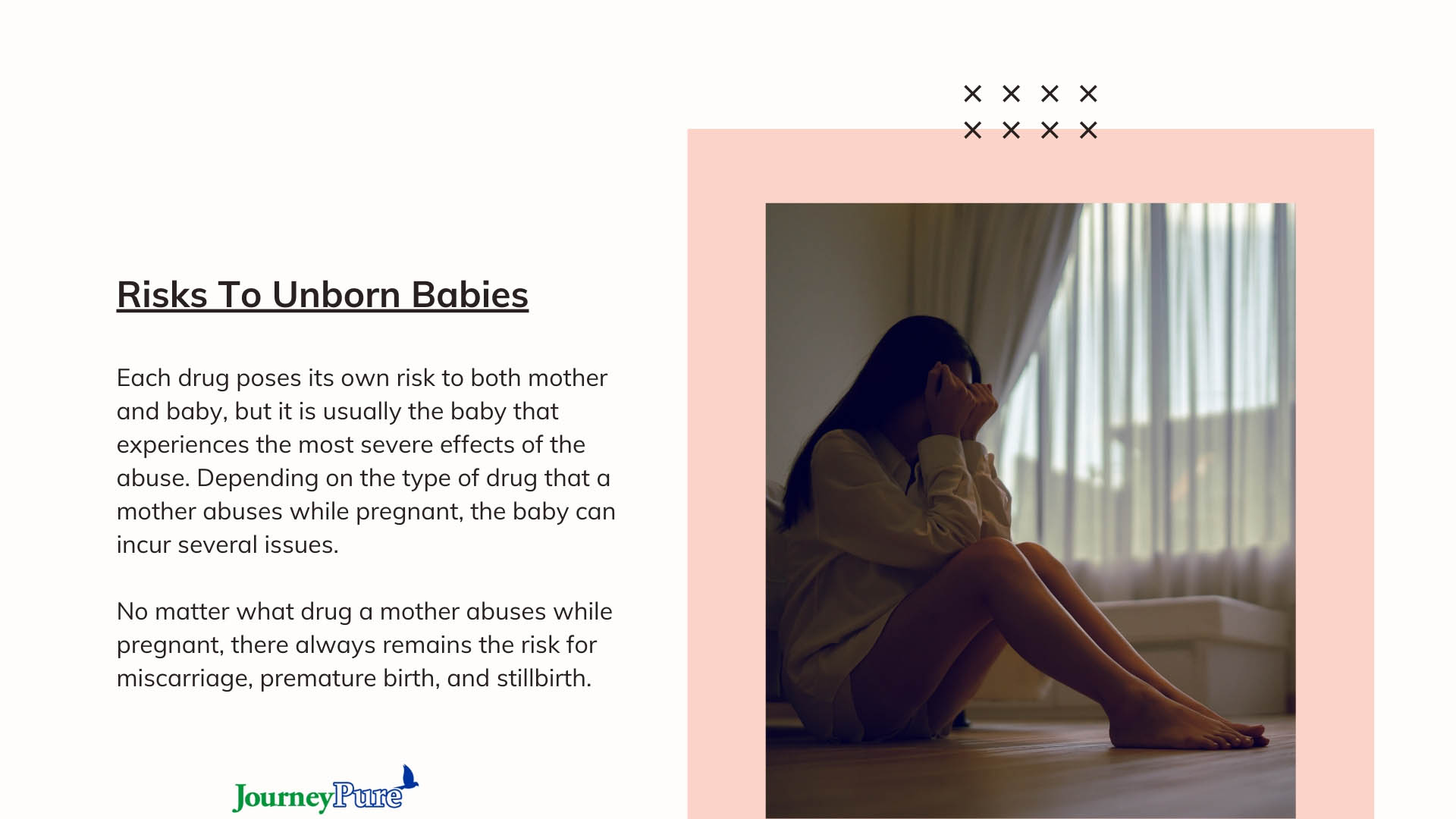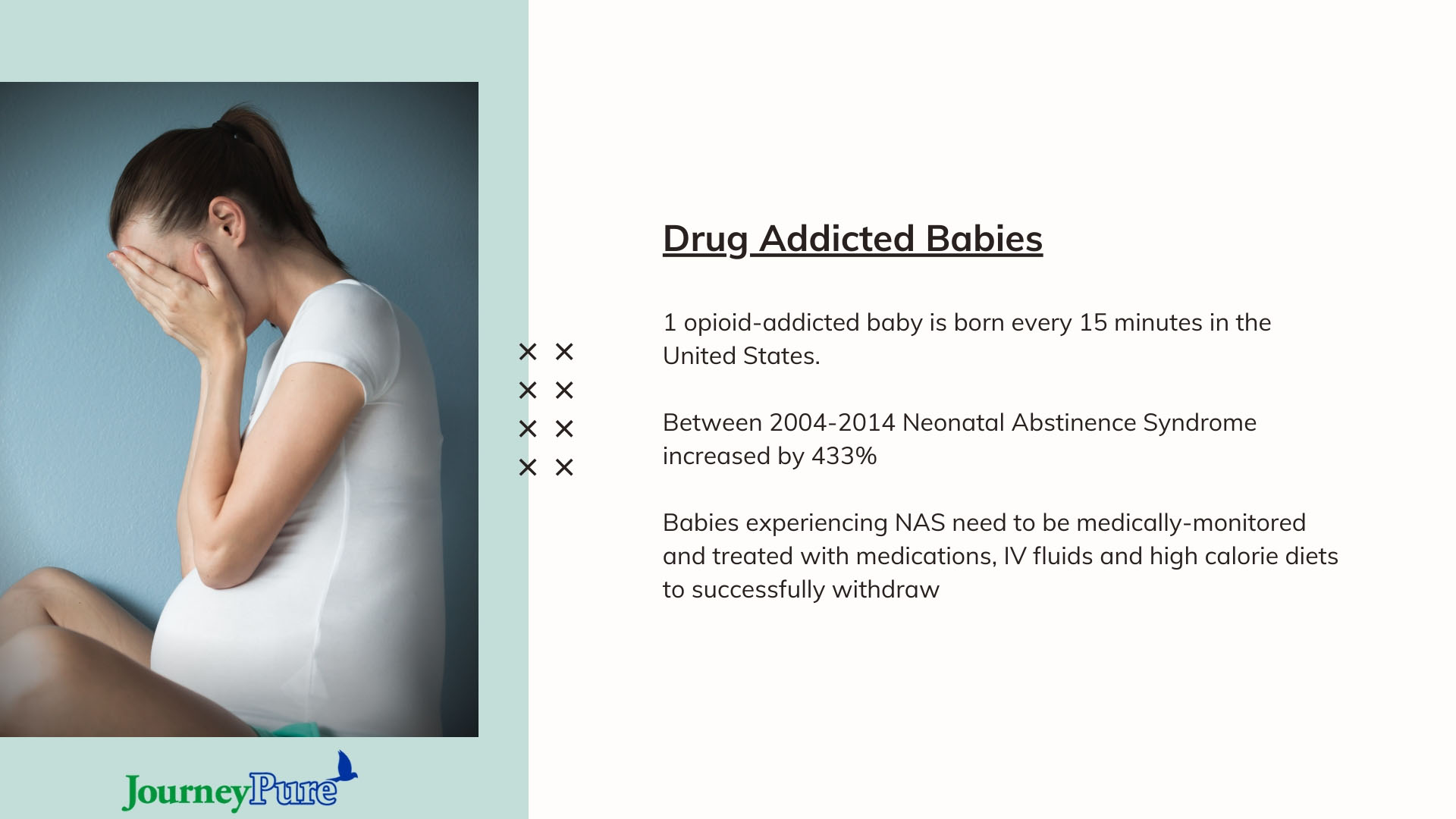The disease of addiction is not one that only affects a specific type of person. It is a non-discriminatory disease that can impact people from all walks of life, including pregnant women. Just because a woman becomes pregnant does not mean that the addiction she has been struggling with disappears. For many pregnant women, in fact, getting pregnant can fuel their addiction even further.
Studies show that an estimated five percent of pregnant women in the United States abuse one or more addictive substances. The National Institutes of Health (NIH) report that behind tobacco and alcohol, pregnant women who struggle with drug abuse most commonly abuse marijuana, cocaine, and opioids. On their own, each one of these substances poses severe health risks to both the mother and the unborn baby. Sadly, it is extremely common for pregnant women experiencing substance abuse and addiction to use more than one of these drugs at a time.

Risks of Drug and Alcohol Use During Pregnancy
When pregnant, women are encouraged to do things such as maintaining a healthy diet, exercise regularly and ensure that they are including prenatal vitamins into their everyday routine. It is never recommended for a pregnant woman, regardless of the circumstances, to abuse drugs and/or alcohol. Not only is engaging in this type of behavior hazardous and potentially fatal to the fetus, but it is just as dangerous for the mother.
The risks that a mother can incur upon herself when abusing addictive substances while pregnant can vary based on what she is abusing. The most severe risk that a woman can experience when she is abusing any type of substance is death, which can be caused by an overdose, alcohol poisoning, or an accident of sorts. Not only does she lose her life, but the unborn child is at risk of losing his or hers as well depending on how many weeks gestation he or she is/the circumstances of the mother’s death.
There is no doubt that alcohol is the most widely abused addictive substance in pregnant women. Women who abuse alcohol while pregnant are put themselves at risk for poor nutrition, being underweight, and abusing other substances (especially tobacco). The effects of alcohol abuse on a pregnant woman are not only physical but also psychological, too. Alcohol is known to cause anxiety and depression, two of the most common mental illnesses in the United States. The symptoms associated with each of these conditions can further encourage a woman to drink, which only increases the symptoms.
Opioids, such as heroin, fentanyl, and oxycodone, are more abused throughout the country than most other drugs. Pregnant women are certainly not exempt from the draw of opioid abuse, which puts them at serious risk if they use while pregnant. Specifically, abusing opioids while pregnant can lead to the following complications:
- Placental abruption
- Premature rupture of membranes
- Preterm labor
- Preeclampsia
- Postpartum heavy bleeding
- Inflammation of fetal membranes
These risks accompany other more common risks of opioid abuse that are often seen in opioid users across the board. These risks include respiratory failure, vital organ failure, and fatal overdose.
Pregnant women who abuse other addictive substances such as meth and cocaine can also experience anemia, skin infections, and malnutrition. Quite arguably the most concerning psychological risk associated with any type of drug or alcohol abuse while pregnant is the increased possibility of experiencing postpartum depression and/or anxiety. Symptoms associated with both of these issues tend to be more severe when drug and alcohol abuse occurred during pregnancy.

Risks to Unborn Baby by Drug Type
Each drug poses its own risk to both mother and baby, but it is usually the baby that experiences the most severe effects of the abuse. Depending on the type of drug that a mother abuses while pregnant, the baby can incur several issues. Consider the following:
Opioids:
- Birth defects that include congenital heart defects, gastroschisis, glaucoma, and neural tube defects
- Low birth weight
- Problems with growth and development
- Premature birth
- Increased risk for sudden infant death syndrome, or SIDS
Stimulants:
- Low birth weight
- Small gestational size
- Neurodevelopmental issues
- Retinal defects
- Cleft palate
- Delayed motor development
- Malformation of ribs
- Cardiac abnormalities
- Fetal distress
Hallucinogens:
- Musculoskeletal problems
- Increased risk of congenital defects
- Cardiovascular abnormalities
- Low birth weight
- Slow milestone achievement
- Developmental delays
- Long-term memory problems
- Impaired learning
Inhalants:
- Premature birth
- Low birth weight
- Delayed growth
- Speech problems
- Poor motor skills
Cannabis:
- Preterm birth
- Fetal growth restriction
- Memory problems
- Learning disabilities
- Behavioral problems
Dissociatives:
- Poor development in certain regions of the brain, including the prefrontal cortex
- Increased risk for depression and anxiety
- Neurodegeneration of the brain
- Cognitive defects
No matter what drug a mother abuses while pregnant, there always remains the risk for miscarriage, premature birth, and stillbirth.
Drug Addicted Babies
The impact of drug addiction is not lost on some newborn babies and those who care for them. In fact, one opioid-addicted baby is born every 15 minutes in the United States, meaning that nearly 100 babies are born every day addicted to heroin, fentanyl, and other opioids. Unfortunately, opioids are not the only type of drug that babies are born addicted to.
Between 2004 and 2014, rates of neonatal abstinence syndrome (NAS) increased by a startling 433%. That means that by 2014, 8 out of every 1,000 hospital births included an addicted baby. Today, opioids are being abused more than ever before, as are prescription drugs like benzodiazepines and newer substances that include bath salts and krokodil. Unfortunately, with regards to the newer substances, the full effects on newborns will not be known until more research is conducted. What we do know is that drug-addicted babies face several obstacles in the first few weeks of their lives because of their exposure to drugs.
What are the Symptoms of a Baby Born Addicted to Drugs
A baby who is born addicted to drugs has what is called neonatal abstinence syndrome, or NAS. NAS is a set of problems that a baby experiences when withdrawing from drugs. As soon as a baby with NAS is born, he or she is no longer receiving drugs from the mother, which is why withdrawal begins. Some symptoms of a baby who is born addicted to drugs are noticeable at first glance, while others become more prominent as time goes on. The types of symptoms that a baby with NAS will experience will depend on a number of factors, such as what type of drug he or she has been exposed to and for how long. Some of the most common symptoms that a baby born addicted to drugs exhibits include the following:
- Excessive crying
- Sweating
- Tremors
- Fever
- High-pitched crying
- Dehydration
- Sleep problems
- Diarrhea
- Hyperactive reflexes
- Vomiting
- Tight muscle tone
- Yawning
- Poor feeding
- Poor suck/latch
- Stuffy nose
- Sneezing
Generally speaking, the more severe the substance abuse, the more severe the withdrawal symptoms are for the newborn.
Addiction recovery that’s built to last
How Long Does it Take a Baby to Withdraw
With adults, withdrawing from drugs can take anywhere from a few days to a few weeks (on average). While many babies born addicted to drugs begin withdrawal, they too can withdraw within a few days to a few weeks, however, the vast majority are done fully withdrawing within 30 days if they are being treated. The total length of time that a baby takes to withdraw from drugs is directly related to the type of drug(s) abused, the length of the abuse, and how severe the abuse was. Other factors specific to the newborn also play into how long it takes for him or her to withdraw. For example, a baby with other pressing issues like a heart defect or low birth weight might take longer to withdraw because his or her body is not healthy enough to withdraw any faster.
As just mentioned, most babies with NAS successfully withdraw within the first month of their lives when they are being treated. Some treatment options to help with the withdrawal process include:
- The use of medications to manage withdrawal symptoms and wean the newborn off the drug/drugs
- Intravenous fluids to help prevent dehydration caused by common withdrawal symptoms like diarrhea and vomiting
- Being fed high-calorie formula to help promote their growth and physical strength
In some cases, it can take up to six months for a baby with NAS to fully withdraw. When this is the case, these babies are often transported to specialized rehabilitation facilities to undergo the appropriate treatment and supervision.
Legal Consequences
There has always been controversy surrounding what (if any) legal action to take against mothers who use drugs while pregnant, thus resulting in problems for their babies. In 25 states and the District of Columbia, healthcare professionals are required to report suspected prenatal drug use while another eight states require healthcare professionals to conduct tests on new mothers if they believe she has been abusing drugs. Drug abuse is not typically something that most people can hide, especially when another human being is involved. Doctors and nurses are able to determine if a newborn baby is struggling with NAS within a short period of time after birth. Therefore, based on their professional requirements, the law must become involved.
Today, 23 states and the District of Columbia have ruled substance abuse during pregnancy to be child abuse. Another three states say that substance abuse during pregnancy will result in civil commitment, which is ordering the mother to be involuntarily committed to a treatment program or hospital.
When a mother is found guilty of child abuse because of her substance abuse, she can face a number of legal repercussions. For example, she may be ordered to seek professional treatment while her newborn resides in the care of a spouse or loved one. Other mothers are not given the same opportunity, and depending on their circumstances, they may have their children taken away from them shortly after birth.
As addiction becomes more destigmatized than before, many states are putting forth programs and opportunities for pregnant women so they can rehabilitate themselves and begin caring for their children. In fact, 19 states have put in place treatment programs specifically designed to help treat pregnant women. Another 17 states and the District of Columbia allow pregnant women the priority at state-funded treatment programs to help get ahead of the curve.
Getting Help At the River’s Treatment Program for Pregnant Women
Experiencing the textbook perfect pregnancy can still bring about several challenges for an expectant mother, never mind if she is struggling with a substance use disorder. Women who are abusing drugs while pregnant require specialized care to help them stop using safely and to receive the appropriate therapeutic care needed to keep from using in the future. For many, that is not an option based on their economic and social status.
At The River, we offer a treatment program developed specifically with pregnant women in mind. We work with expectant mothers to help them end their active substance abuse without putting themselves or their babies in harm’s way. We offer compassion and encouragement and work to put together individualized treatment plans that meet the needs of each and every mother-to-be who comes through our doors.
If you are pregnant and are abusing drugs or alcohol, do not throw in the towel. You do not have to keep using, nor do you need to be worried about being shamed for reaching out for help. The most important thing you can do for yourself is to get the help you need so that you can preserve the health and wellbeing of yourself and your baby. When you are equipped with the skills needed to cope, you do not need to turn to drugs and alcohol anymore. And, with that new ability, you will be able to spend more time with your new baby when he or she is born.
So, do not risk going to term while still using. There are not only serious legal repercussions of doing so, but there are also many risks to you and your baby’s health that can compromise your livelihood.
Call us right now. We can help.

